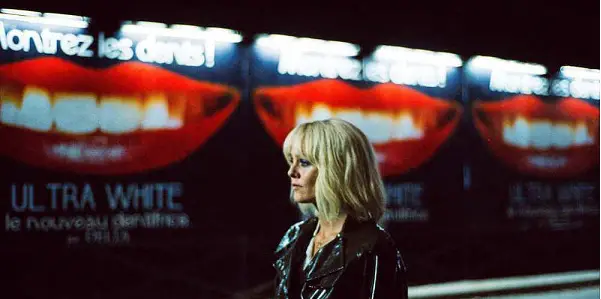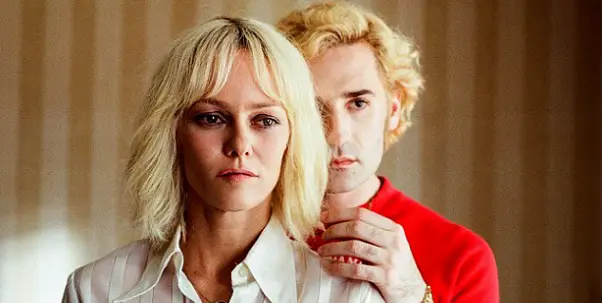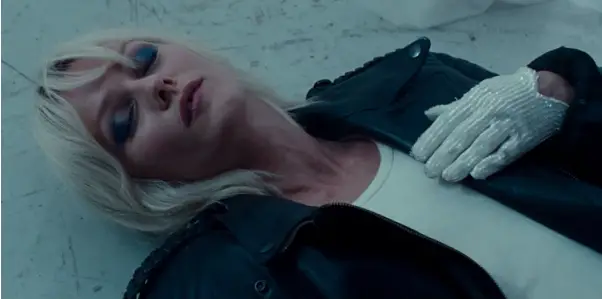Interview With Writer/Director Yann Gonzalez Of KNIFE + HEART At Fantastic Fest 2018

Hazem Fahmy is a poet and critic from Cairo. He…
In his first feature in five years, acclaimed French auteur Yann Gonzalez takes us through a stylized and brutal world of sex, murder and, of course, cinema. Knife + Heart premiered at the 2018 edition of the Cannes Film Festival and more recently had its North American premiere at Fantastic Fest in Austin, TX. We sat down with Mr. Gonzalez for a riveting conversation on horror, queerness, Brian De Palma‘s Phantom of the Paradise, and the mystique of celluloid.
Hazem Fahmy for Film Inquiry: For starters, I wanted to ask you: gay porn and slashers, how did it come together?
Yann Gonzalez: I love the idea of merging different things, you know? I think I do this all the time in my films, even within one sequence. To me, it’s super exciting. Mixing gay porn and a horror film was [just] super exciting for me. That’s a strange mixture, and I love strange mixtures. To me, sex and violence–it’s cathartic, and a film must be cathartic. I think my favorite films have always been cathartic, like the horror films I used to watch as a kid. They were [cathartic] and also super violent, and that revealed something in myself, something I didn’t know at a time. These films, I think, are the most powerful kinds of film because they picture violence, and it brings the demons out.
Absolutely. I read somewhere that your parents would try and prevent you from seeing horror films.
Yann Gonzalez: Yes! At the same time, they were arousing me with the stories. They were talking about The Exorcist and they would tell me: “You can’t see [the film] because you’re eight years old,” but at the same time they were telling me what was in the film, so it was even worse because I would picture the images in my mind and it was really something horrible and it put me into nightmares and I was really scared. I think I would have been less scared if I had seen the movies, so it was kind of perverted of my parents to do this.
When you were developing the idea for this film, did you think of the sex or the horror first?
Yann Gonzalez: It was love first. [That] was before anything else. I was inspired by a real female porn producer. Very underground. No one in France really knows her, but she was a real pioneer in her art. She made tons of crappy porn films, mostly shot in one day, on the same couch, so you can find the same couch from film to film.
That’s hilarious.
Yann Gonzalez: It is! Unfortunately, most of the films have disappeared ’cause they were only there to make money. I think they were crappy. The woman, she died, I think twenty years ago. But I loved the character. I think to portray a woman surrounded by young men, having her own porn industry–she owned the cinema, the theater, she was directing and producing, only with guys surrounding her. I think she was ahead of her time in a way. At the same time, she was in love with her editor.
That really drove me to write the story. Of course, it was fantasy, but a few of the elements were true. I love the idea of love going through the images. Like, a woman making a film and, believing with her [whole] heart that she could seduce again this other woman with just cinema, with her images. I love this idea of the feelings going through the images, like a venom, a love venom.

One of the most interesting things about the film is that there are no healthy relationships in it. I don’t want to spoil anything for the readers, but let’s just say things get very complicated.
Yann Gonzalez: Yes, there’s a lot of violence. Love can be absurd. It can be excessive, it can be super violent. I think those characters are not so empathetic for the viewer. I think the love we can have for her, its eroding little by little. [Especially] when at some point, she passes the barrier, she does something really horrible with her love. I wanted her to be despicable and lovable at the same time, violent and touching like a kid. And I think Vanessa Paradis was the perfect person to portray this because sometimes she can be super intense and violent and super nervous, but other times she sobs like a kid. This is what moves me when I film her.
She really brought out the borderline insanity of the character.
Yann Gonzalez: Yeah, insane and fragile at the same time.
Speaking of fragility, I was wondering what’re your thoughts on portraying the [queer] community at that time in the way you do. There’s been a lot of discourse around queer cinema recently, especially with regards to films like Call Me By Your Name–there’s this question on how confrontational queer cinema should be. Should it just depict normalized stories, or should it confront the viewer with the history? Was that a part of your process?
Yann Gonzalez: I think I just wanted to depict an ideal world, a world that would reverse–not the values–but the norm of our society. [We’re] in such a patriarchal, manly and heterosexual society, that bringing a cast of characters that are 98% queer (gay, lesbian, and transgender)–not to depict them as unpleasant characters, but as lovable characters–for me it was like an invitation to the audience. I didn’t want the homosexuality to be a subject. I didn’t want it to be something that was discussed in the film. It was there. And that’s all. That was the most important thing to me. And I think after a few minutes you forget that the film is only portraying queer people.
They become just people.
Yann Gonzalez: Exactly, there is no issue at all in being gay. The issue is that there is a murderer killing those people. To me it was just picturing a lost island before AIDS came up. Of course, we can interpret the murders like the threat of AIDS. You can see the film as you want, but to me it’s more the violence of society, society stabbing gay people in the ass. In France, it has been violent. With gay marriage, which was [only] like four or five years ago, and then there were lots of people in the streets against gay marriage. Like straight families, with kids, thousands of people protesting, lots of protests. This to me was super violent. I think I received this violence and I put it into my film. To me, there is the monster of the film, the real monster of the film was the society, it was not the monster of the film.
I know you’ve mentioned that you’ve drawn a lot of influence from Argento and Brian de Palma. Any films in particular?
Yann Gonzalez: I saw Phantom of the Paradise again two weeks ago, and this is one of the films I [showed] to the actor who plays the killer, Jonathan Genet, who was the lead in the last Żuławski film, Cosmos. There’s something so childish in Phantom of the Paradise. It’s like a kid playing with the images, and trying to invent and expand on them at every moment in the film. And I loved it, so much. [It] brings together so many atmospheres; it’s a comedy, it’s a tragedy, it’s super goofy, it’s super stupid at some points, it’s a musical, it’s a horror film. It’s so many things at the same time, and it’s dealing with everything in such a brilliant way.
Brian de Palma is my favorite director ever, and maybe it’s not my favorite film of his because I think he made stronger films. For instance, every time I see Carrie or Obsession, I cry, and cry, and cry, for half an hour at least. But with Phantom of the Paradise, you have this guy, this is maybe his third or fourth important picture– I think he made maybe five or six pictures before, but this is really one of the first important pictures he made, and he’s still so young at heart. You can feel the vibration of youth, the joy of making cinema and the artifice of cinema all the time in that [film]. That can be very exhilarating.
I’m seeing all kinds of similarities now that I think about it. From the masked monster to the relationship between creativity and violence; how a beautiful thing can have a really dark past. You mentioned the joy of filmmaking, which I think is really present in the film–
Yann Gonzalez: Thank you!
Like the way the opening sequence was unfolding, as Lois was editing and the murder was happening, I just kept thinking to myself: “God, snapping film like that must be so satisfying.”
Yann Gonzalez: This is why I mostly still watch films from the Seventies or Eighties. I think we kind of lost this naivety of cinema; just opening yourself and trying to be as free as you can, and expressing your joy [in] making a film. It’s getting more and more rare that you can feel this joy in making a film. There are too many producers, too many people involved in the filmmaking process. I think you lose this childish aspect of making a film, which I think is super important.
Is there something you do on set, or in preparing with your actors, to maintain that sense of joy in making a film?
Yann Gonzalez: It has to be contagious. Of course, it’s the job of the filmmaker, but you must choose the right people to maintain this joy. And it’s very fragile because there’s lots of tension on the set; sometimes it’s really excruciating to go through one day of shooting. There are so many issues, so many problems all the time. I think I was really lucky because, 95% of the time I was surrounded by people who were really kids at heart. And especially Vanessa Paradis, she has this real innocence, and this kindness of a kid. She’d never acted like a star, she was part of the crew, and that’s all, expressing the same joy as the crew. It was really contagious. We were like a bunch of kids doing film.

That’s amazing. Were you particularly close with any of the cast or crew before this film? I knew you’d collaborated with some of them.
Yann Gonzalez: Yeah, I worked on my first feature film with Kate Moran, who is an American actress and plays the editor in the film. [Also] Nicolas Maury, who plays Archibald in the film, he was in my first feature film. And Kate [as well] who was in my first three short films–so we grew up together as artists. It’s a long relationship and we’ve known each other very well. To me, when I’m on set with her, it’s like being a telepath because I already know how she’s gonna move, it’s like I’m reading her mind. I don’t need to tell her what to do. We understand each other really well in a really mystical way.
Maury had an absolutely infectious energy in the film.
Yann Gonzalez: I agree! I think he’s one of the most brilliant actors of today in France. Every take he proposes something different in a very adventurous way. So it’s such a joy to see the dailies while he’s on screen. I’ve worked with a lot of people from the crew before, like the DOP [Simon Beaufils], we made the first feature together, and some shorts, too. Same with the set designer, we’ve been working together for years. It’s like building a kind of family. Of course, it’s an ephemeral family, because it’s mostly people I don’t see when I am not making a film. But we’re friends during the shooting, and it’s enough, you know?
It really makes us stronger. For each film, it’s really important to bring different people, and to extend the family. Because otherwise it would be dead. You have to find the right talents to find this familial film, which to me is reassuring, when you’re on set and you have to give instructions to people. It’s horrible. Especially for someone–I’m super shy! So to be surrounded by people that you know and that you trust, is the most wonderful thing.
Were there days on the set where you, or other crew members, felt were challenging given the content of the film, and how upsetting a lot of the scenes are?
Yann Gonzalez: Not really because of the content. [But] because of the locations – sometimes the locations were difficult; small or hot. Some of the most difficult sequences did not look that difficult on screen, for example the sequence in the bar, were there’s a group of prostitutes–
Oh! Really?
Yann Gonzalez: Yes, it’s super surprising! This sequence was super difficult, and the cabaret sequence as well because there was a woman on stage, she was crazy. She’s a theater artist and […] very extreme. She was totally crazy, she took drugs on the set and was…out of control. I didn’t know how to manage her. She was super touchy at the same time […] she was always hugging me like a little kid, like: “I’m so happy to be here,” and stuff, and then the music was starting, and she was doing a lot of really crazy things with the other actress [on stage]. At one point, she wanted to pee on her and I was like, [no] this is too much for me. So I felt I was very shy with meeting these kinds of people. But it’s part of the scene, we had to shoot an extra three hours in two months because it was a small budget, it was horrible, really difficult.
How was shooting on film?
Yann Gonzalez: I’ve always shot on film. To me, film is part of cinema. I’m really grateful to people like Tarantino, they really saved film. I think without him, and a few other directors from the US, Kodak would have stopped making film. Film is part of the magic of cinema. It’s like entering another dimension. When you shoot on digital, it’s like shooting exactly what you see, but with film there is a different layer that puts the film in a different dimension. It’s magical, something mystical. It’s chemistry.
And the exciting thing is that you never know what’s gonna really appear, what’ll be revealed, thanks to the film, and I think [that] puts the whole crew in a certain atmosphere because you can’t lose a lot of takes. So most of the time, it was about three or four takes, maximum, because we were kind of broke. Everyone’s super focused. The whole energy of the film community is put into the sequence. It’s also like a prayer, you know? Everyone’s so focused and you can feel their energy, and you can’t get that on digital. So I can’t imagine myself shooting on digital. Not now. Not never.

What would you like to do next?
Yann Gonzalez: I don’t really know yet precisely, but I want to do something more simple than this film. I want to write super fast. Maybe making a sort of guerilla film, with a small crew. No budget. 16mm. And–I don’t know. The only word that comes to my mind is a trip, a journey. I really want to shoot a journey. I don’t know what kind it’s going to be, but I’m just picturing some character travelling a lot. Maybe a road movie or something like this, but it’s going to be very different from [my] previous films.
Film Inquiry thanks Yann Gonzalez for taking the time to talk with us.
Does content like this matter to you?
Become a Member and support film journalism. Unlock access to all of Film Inquiry`s great articles. Join a community of like-minded readers who are passionate about cinema - get access to our private members Network, give back to independent filmmakers, and more.
Hazem Fahmy is a poet and critic from Cairo. He is an Honors graduate of Wesleyan University’s College of Letters where he studied literature, philosophy, history and film. His work has appeared, or is forthcoming in Apogee, HEArt, Mizna, and The Offing. In his spare time, Hazem writes about the Middle East and tries to come up with creative ways to mock Classicism. He makes videos occasionally.













